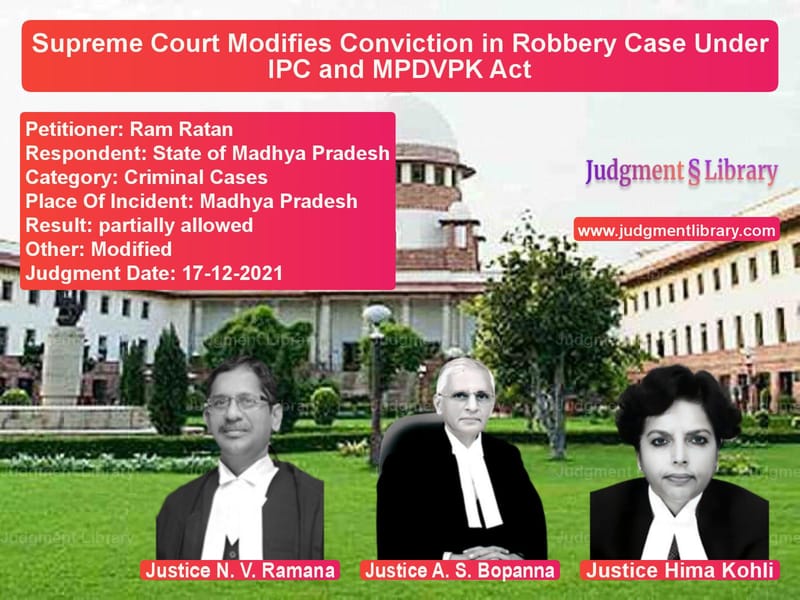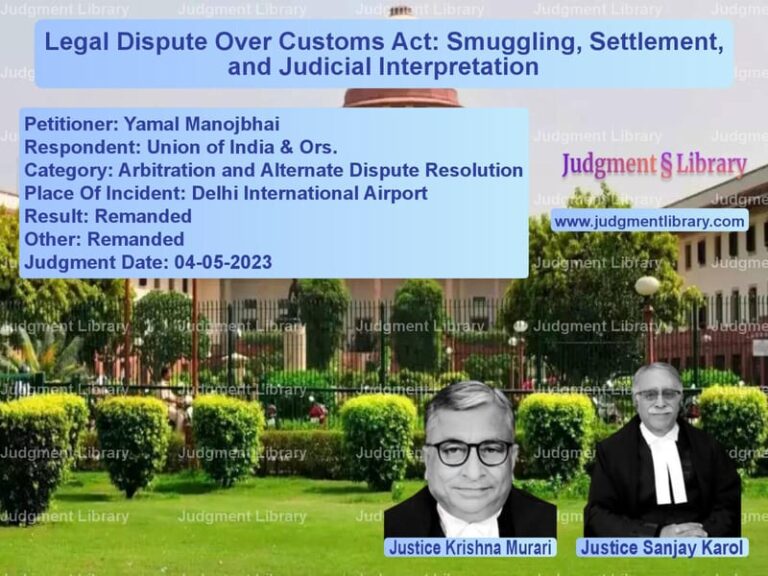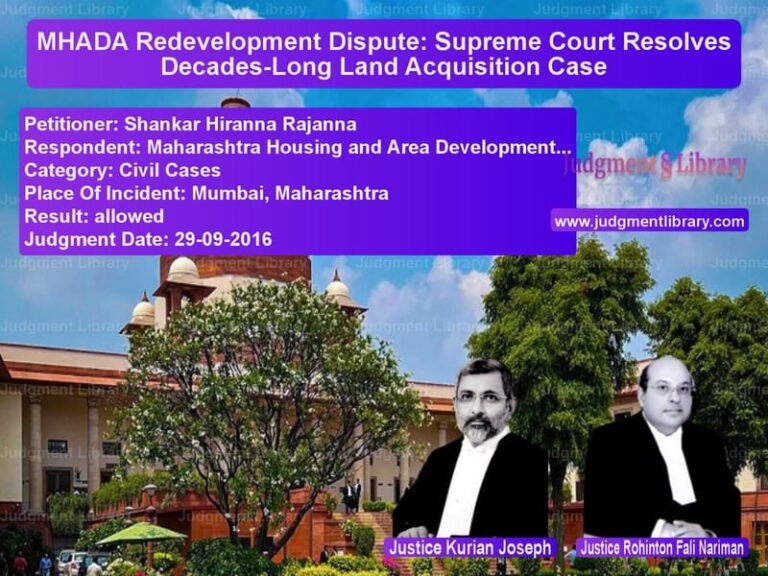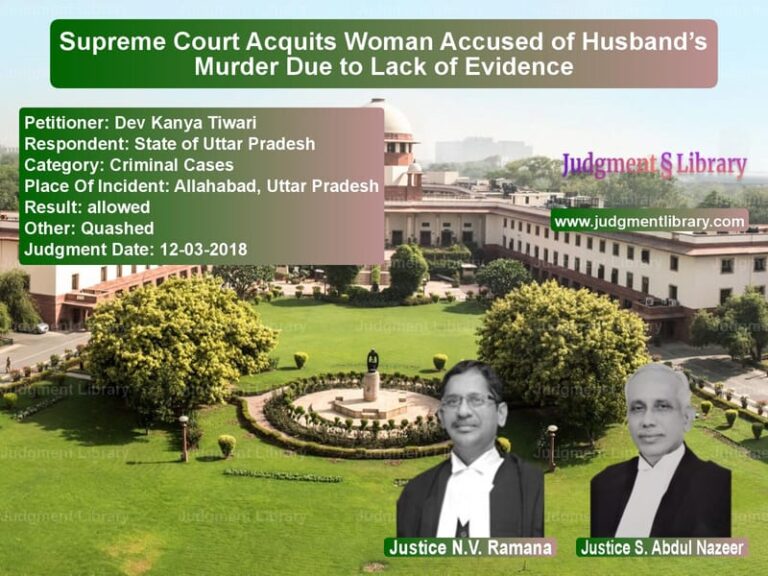Supreme Court Modifies Conviction in Robbery Case Under IPC and MPDVPK Act
The Supreme Court of India, in a crucial ruling, modified the conviction and sentence of the appellant, Ram Ratan, in a robbery case under Section 392 and Section 397 of the Indian Penal Code (IPC), along with Sections 11 and 13 of the Madhya Pradesh Dakaiti Aur Vyapharan Pravbhavit Kshetra Adhiniyam (MPDVPK Act), 1981. The Court ruled that while the conviction under Section 392 IPC was valid, the charge under Section 397 IPC and the MPDVPK Act was not substantiated, leading to a reduction in the sentence.
Background of the Case
The case stemmed from an incident on June 26-27, 2012, in Madhya Pradesh, where the complainant, Rajesh Meena, alleged that he was robbed at gunpoint while guarding his field. The accused, including the appellant, were alleged to have snatched his motorcycle and mobile phone. Following an investigation, the accused were charged under Sections 392 and 397 IPC and the MPDVPK Act. The Special Judge convicted the appellant and sentenced him to seven years of rigorous imprisonment. This conviction was upheld by the Madhya Pradesh High Court.
The appellant, Ram Ratan, challenged the High Court’s ruling before the Supreme Court, arguing that his conviction under Section 397 IPC was not justified as he had not personally used any deadly weapon.
Arguments Presented by the Appellant
The appellant, represented by his counsel, made the following arguments:
- The prosecution failed to establish that the appellant used any deadly weapon during the robbery.
- The trial court and the High Court erred in applying Section 397 IPC to the appellant when the only co-accused, Raju alias Rajendra, was in possession of a firearm.
- Even if robbery was committed, the appellant’s role was limited, and his sentence should be reconsidered.
- The conviction under the MPDVPK Act was not justified as there was no organized crime element involved.
Arguments Presented by the State
The State of Madhya Pradesh, represented by its counsel, argued:
- The evidence on record established that the appellant was part of a group that committed robbery.
- The complainant and witnesses clearly identified the accused as the perpetrators.
- The firearm used during the robbery was seized, and forensic examination confirmed that it was operational.
- Even if the appellant did not personally use the weapon, he actively participated in the robbery and should be held equally liable.
Supreme Court’s Observations and Ruling
After hearing the arguments, the Supreme Court made the following key observations:
- The use of a weapon is a crucial element under Section 397 IPC, and mere presence at the scene does not automatically attract the provision.
- The evidence on record confirmed that only co-accused Raju alias Rajendra used the firearm, while there was no proof that the appellant brandished or used a weapon.
- The conviction under Section 392 IPC for robbery was upheld, as the appellant participated in the crime and shared the stolen goods.
- The MPDVPK Act, which deals with organized crime, was not applicable in this case, as the robbery was not linked to any established crime syndicate.
- The appellant had already served over three years in prison, which was deemed sufficient punishment for his role in the crime.
The Supreme Court stated:
“The conviction under Section 397 IPC can be fastened only on the ‘offender’ who actually uses the firearm. Since the facts and evidence do not indicate that the appellant used the firearm, the charge under Section 397 IPC and Section 11/13 of the MPDVPK Act, 1981, cannot be sustained.”
Read also: https://judgmentlibrary.com/death-penalty-commuted-to-life-imprisonment-in-child-murder-case/
Key Legal Precedents Considered
- Shri Phool Kumar v. Delhi Administration – Held that Section 397 IPC applies only to the offender who personally uses the weapon.
- Dilawar Singh v. State of Delhi – Clarified that for Section 397 IPC to apply, a deadly weapon must be used, not merely possessed.
- Ganesan v. State Rep. by Station House Officer – Distinguished between Sections 397 and 398 IPC, emphasizing that use of the weapon is necessary for enhanced punishment.
Final Verdict
The Supreme Court modified the appellant’s conviction and sentence as follows:
- The conviction under Section 397 IPC and Sections 11/13 of the MPDVPK Act was set aside.
- The conviction under Section 392 IPC for robbery was upheld.
- The sentence was reduced to the period already undergone (three years and five months).
- The appellant was ordered to be released immediately if he had paid the fine imposed by the trial court.
This ruling reinforces the principle that enhanced punishment under Section 397 IPC applies only to the offender who personally uses a deadly weapon during the commission of a crime. It also ensures that individuals are sentenced proportionately to their actual role in the offense.
Petitioner Name: Ram Ratan.Respondent Name: State of Madhya Pradesh.Judgment By: Justice N. V. Ramana, Justice A. S. Bopanna, Justice Hima Kohli.Place Of Incident: Madhya Pradesh.Judgment Date: 17-12-2021.
Don’t miss out on the full details! Download the complete judgment in PDF format below and gain valuable insights instantly!
Download Judgment: ram-ratan-vs-state-of-madhya-prad-supreme-court-of-india-judgment-dated-17-12-2021.pdf
Directly Download Judgment: Directly download this Judgment
See all petitions in Attempt to Murder Cases
See all petitions in Fraud and Forgery
See all petitions in Judgment by N.V. Ramana
See all petitions in Judgment by A. S. Bopanna
See all petitions in Judgment by Hima Kohli
See all petitions in partially allowed
See all petitions in Modified
See all petitions in supreme court of India judgments December 2021
See all petitions in 2021 judgments
See all posts in Criminal Cases Category
See all allowed petitions in Criminal Cases Category
See all Dismissed petitions in Criminal Cases Category
See all partially allowed petitions in Criminal Cases Category







